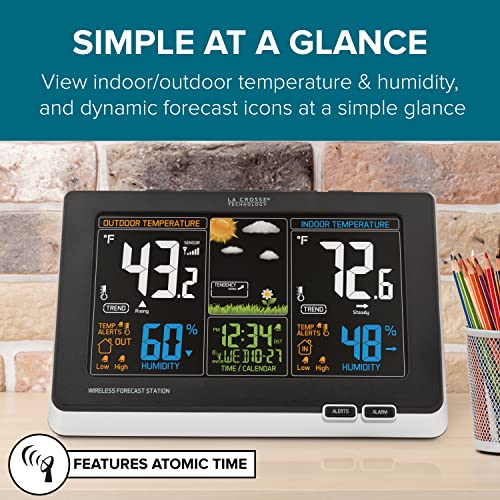All Categories










La Crosse Technology Advanced Weather Station with Full-Color LCD & Atomic Time - Monitor Indoor/Outdoor Conditions with Temperature Alerts and Humidity Readings with Transmission Range of 300 Feet
Share Tweet
Get it between 2025-01-20 to 2025-01-27. Additional 3 business days for provincial shipping.
*Price and Stocks may change without prior notice
*Packaging of actual item may differ from photo shown
- Electrical items MAY be 110 volts.
- 7 Day Return Policy
- All products are genuine and original
- Cash On Delivery/Cash Upon Pickup Available








La Crosse Technology Advanced Weather Station with Features
-
Full color LCD with weather icons: sunny, partly sunny, cloudy, rainy, stormy, snowy
-
Atomic self-setting accurate time & date with automatic daylight saving time resets.Outdoor humidity range: 19% to 97% RH. Indoor humidity range: 19% to 97% RH
-
Monitors indoor & wireless outdoor temperature (f/c) & humidity (%RH) with recorded min/max values. Unit must be plugged in for continuous back light
-
Temperature alerts (indoor/outdoor). Display: 5.0V AC adapter for primary power; Requires 3 "AAA" Alkaline batteries for backup (not included)
-
Reception & low battery indicators. Indoor humidity range: 19 percentage to 97 percentage RH. Temperatures below - 20°F (-28.8°C) require Lithium batteries in the outdoor sensor.Forecast tendency indicator.Signal strength icon for sensor transmission
About La Crosse Technology Advanced Weather Station With
Full color display gives you current temperatures & humidity, with a future forecast whether it could be sunny or rainy to snowy. Features accurate, self-set atomic time & date with automatic DST updates. Records min/max values and alerts you of extreme temperatures. Also displays your heat index and dew point. Will indicate of low battery and reception strength. Batteries required (not included.).Weather Station Factory Restart Explanation: The factory restart returns the weather station and outdoor sensor to an ?out-of-the-box? default state and often resolves an issue. Factory Restart: 1. Remove all power (batteries and AC) from outdoor sensor and weather station. 2. Press one of the buttons on the weather station at least 20 times to clear all memory. 3. Verify that the weather station is blank before proceeding (there may be lines painted on the screen that will show when there is no power). 4. Leave both units without power for 15 minutes (very important). 5. Insert the AC power cord into the wall outlet then into the weather station. 6. Insert fresh batteries into the outdoor sensor. 7. Press the TX button on the outdoor sensor to transmit RF signal. 8. Keep the outdoor sensor 5-10 feet from the weather station. 9. When RF connection is established, the temperature will appear on the station. Allow the outdoor sensor and weather station to sit together for 15 minutes to establish a strong connection. 10. Do not press buttons for 15 minutes. For optimum 433MHz transmission, place the outdoor sensor no more than 300 feet (91 meters, open air) from the weather station Explanation: The factory restart returns the weather station and remote sensor to an “out-of-the-box” default state and often resolves an issue. Factory Restart: 1. Remove all power (batteries and AC) from remote sensor and weather station. 2. Press one of the buttons on the weather station at least 20 times to clear all memory. 3. Verify that the weather station is blank before proceeding (there may be lines painted on the screen that will show when there is no power). 4. Leave both units without power for 15 minutes (very important). 5. Insert the AC power cord into the wall outlet then into the weather station. 6. Insert fresh batteries into the remote sensor. 7. Press the TX button on the remote sensor to transmit RF signal. 8. Keep the remote sensor 5-10 feet from the weather station. 9. When RF connection is established, the temperature will appear on the station. Allow the remote sensor and weather station to sit together for 15 minutes to establish a strong connection. 10. Do not press buttons for 15 minutes. • For optimum 433MHz transmission, place the remote sensor no more than 330 feet (100 meters, open air) from the weather station. Note: In Mounting/Positioning Remote sensor First: Place the remote sensor in the desired shaded location and the weather station in the home. Wait approximately 1 hour before permanently mounting the remote sensor to ensure that there is proper reception. POSITION Outdoor: • Protect the remote sensor from standing rain or snow and from the overhead sun, which can cause it to read incorrectly. • Mounting under an eave or deck rail works well. • If you choose, you can construct a small roof or box for the remote sensor. Be sure a box has vents. • Mount the remote sensor on the North side where to prevent sun from causing incorrect readings. • Mount at least 6 feet in the air for a strong RF (radio frequency) signal. • Do not mount the remote sensor on a metal fence. This significantly reduces the effective range. • Remote sensors are water resistant, not waterproof




















